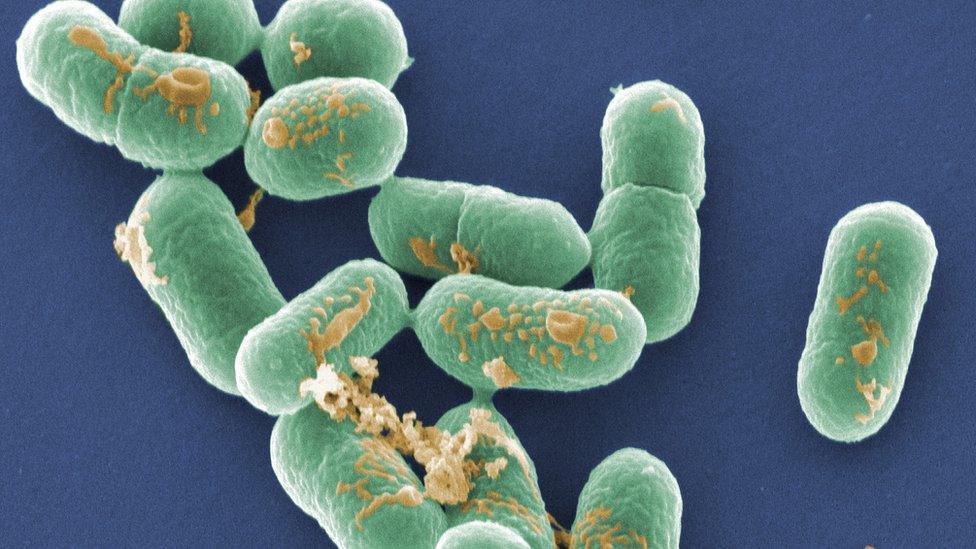Person dies in listeria outbreak linked to cheese
- Published

Listeria has been linked to batches of the soft cheese Baronet
One person has died in a listeria outbreak and people have been warned to avoid Baronet semi-soft cheeses which were recalled as they were contaminated with a related strain of the bacteria.
The Food Standards Agency (FSA) warned people not to eat the cheeses as they contained high levels of the bacteria.
The FSA has not confirmed The Old Cheese Room, in Wiltshire, which makes the cheeses, was the source.
The firm said it was working "closely" with the FSA.
There have been three cases of listeria linked to the outbreak, resulting in the death of one person, the FSA confirmed.
Several batches of Baronet, Baby Baronet and Mini Baronet soft cheeses made by the Old Cheese Room have been recalled., external
The agency is continuing to investigate whether the person who died had eaten Baronet cheese.
Cases were identified in the south of England and London, but the product is distributed nationally.

Listeria bacteria can cause mild symptoms like stomach ache but can cause more serious complications
Tina Potter, the FSA's head of incidents, said: "A closely genetically related strain of listeria monocytogenes found in samples of Baronet cheese, was found in all three cases in this outbreak.
"However, that does not necessarily mean that all those involved in the outbreak contracted listeriosis as a result of eating Baronet cheese.
"Although a source of listeria has been found in cheese products, work to ascertain the cause of the outbreak is continuing."
The agency said the outbreak strain has also been found in some food products and samples taken from other places where the cheese has been sold, supplied and served from.
The bacteria can cause listeriosis, a rare infection that usually goes away on its own, but can have serious complications including causing meningitis.
Symptoms can be similar to flu and include a high temperature, muscle ache or pain, chills, feeling or being sick and diarrhoea.
The Old Cheese Room said that none of its other cheeses have been affected by the outbreak.
'Every batch tested'
"As a responsible cheesemaker we carry out regular cleaning, disinfecting and swab testing of our making and ripening rooms," they said in a statement.
"Since the test that showed a trace of listeria monocytogenes in a single batch of Baronet, we have changed our monthly testing regime to positive release - this means that we test every batch of cheese before it leaves us.
"None of our other cheeses have been affected by this."
Ms Potter said vulnerable people should be particularly concerned with following the product recall advice, including pregnant women and the elderly.
Guidance issued by the UK Health Security Agency (UKHSA) said Baronet cheese is sold in both small individual rounds and as 1kg wheels.
"The cheeses are sometimes served sliced from a deli counter, so it may not always be clear whether you have purchased an affected product.
"If in doubt, consumers are advised to contact the retailer they bought their cheese from to find out if the Baronet cheese they have purchased is from the batches affected and in the meantime to not eat the product," the guidance states.
Richard Elson, UKHSA head of incidents and response, said: "Listeriosis is a rare infection and most people will only experience mild symptoms such as abdominal pain or diarrhoea, which usually pass within a few days without the need for treatment.
"But people with weakened immune systems, who are pregnant, or are infants or elderly are at greater risk of developing severe symptoms."

Follow BBC West on Facebook, external, Twitter, external and Instagram, external. Send your story ideas to: bristol@bbc.co.uk , external